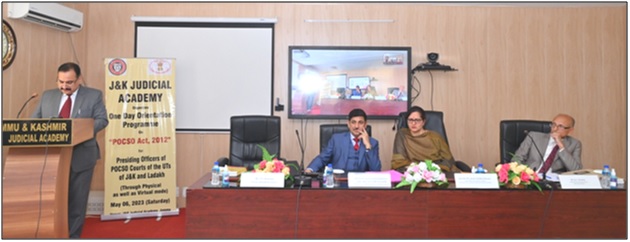Act instrumental in providing robust justice mechanism for victims of sexual abuse: Justice Sindhu Sharma
JAMMU: Under the patronage of Justice N. Kotiswar Singh, Chief Justice, High Court of Jammu & Kashmir and Ladakh, (Patron-in-Chief, J&K Judicial Academy) and guidance of Justice Sindhu Sharma, Chairperson, Governing Committee for J&K Judicial Academy and Justice Vinod Chatterji Koul, Justice Javed Iqbal Wani, and Justice Wasim Sadiq Nargal, Members of Governing Committee, J&K Judicial Academy organized One day Orientation Programme on POCSO Act, 2012 via physical as well as virtual mode for Presiding Officers of POCSO Courts of the UTs of Jammu & Kashmir and Ladakh at Judicial Academy, Jammu.
The training programme was inaugurated by Justice Sindhu Sharma, Judge, High Court of J&K and Ladakh and Chairperson, Governing Committee for Judicial Academy in the presence of Justice Vinod Chatterji Koul, Judge, High Court of J&K and Ladakh and Member, Governing Committee for Judicial Academy and Kikar Singh Parihar, Former District & Sessions Judge , who were the resource person in the orientation programme. The training programme was conducted by Y.P. Bourney, Director, J&K Judicial Academy.
Justice Sindhu Sharma, in her inaugural address, stated that POCSO Act, 2012 intends to protect the child through all stages of judicial process and gives paramount importance to the principle of best interest of the child. She observed that the Act has been instrumental in providing a robust justice mechanism for the victims of sexual abuse and has highlighted the significance of child rights and safety.
She emphasised that the Act covers punishment for both non-penetrative sexual assault and aggravated penetrative sexual assault.
In the inaugural session, Justice Vinod Chatterji Koul underlined the purpose of imparting training is to enhance the performance of Judicial Officers and to remove inhibitions while applying the provisions of law in their court work. He observed that the Protection of Children from Sexual Offences Act, 2012, (POCSO Act) and its corresponding rules were enacted with the objective of protecting children from a slew of sexual offences and introducing child-friendly judicial mechanisms for dealing with such offences effectively in a time bound manner.
Y.P. Bourney, Director, J&K Judicial Academy presented the welcome address and gave an overview of the programme.
He said that despite the existence of such comprehensive child sexual abuse laws in our country, the scale of such abuse is staggering. The POCSO Act is aimed at to make the criminal justice system more child-friendly and to prevent re-traumatisation. He emphasised that the POCSO Act already makes the procedure child friendly and this approach should be followed by the judicial officers, magistrates, and police officers so that the child victims could repose trust in them.
In the first technical session, Justice Vinod Chatterji Koul guided the participants about the relevant provisions of POCSO Act, 2012.
The resource person discussed that the Protection of Children from Sexual Offences Act (POCSO Act in short) was passed by the parliament in the year 2012 and provides for establishment of Special Courts for trial of such offences and for matters connected therewith or incidental thereto. The POCSO Act is a gender-neutral statute that recognizes a child as someone under the age of 18. He stated that the Act has a broad-spectrum definition of what constitutes a sexual offence against a child and further expands the definition of sexual assault to cover both non-penetrative and aggravated penetrative sexual assault (Sections 3–10) and is also inclusive of penalties for those in positions of trust, such as public workers, educational personnel, and police officers.
In the second technical session, the resource person Kikar Singh Parihar deliberated on the topics of child-friendly court proceedings and Victimology, deposition of Child witnesses and vulnerable witnesses deposition guidelines. He highlighted that the POCSO Act is a comprehensive piece of legislation that includes in itself everything from how the statement of the child should be recorded, to the medical examination, to the designation of special child-friendly courts and further amendments have been made in the Act via the Protection of Children from Sexual Offences (Amendment) Act, 2019, under which the punishments for the offences have been made more stringent.
He emphasised on the need to sensitize the public regarding child sexual abuse and its ill effects on the health and psychology of the victim so that there is no reluctance in reporting these crimes.
Later, an interactive session was held during which the participants deliberated and discussed various aspects of the subject topic and raised queries which were addressed satisfactorily by the resource persons.


